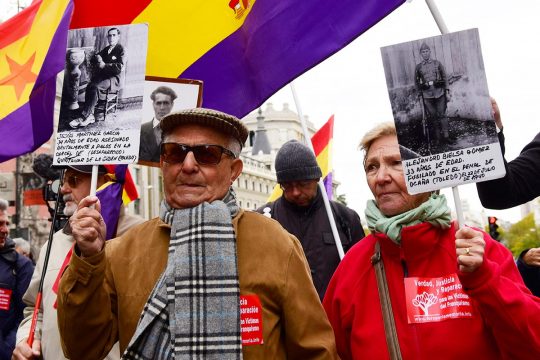As the director of a peace museum in Spain's Guernica, the Basque town infamously destroyed during the civil war, Iratxe Momoitio has often heard young visitors ask a surprising question.
"What is ETA?"
A disturbing lack of knowledge in a region torn apart by decades of killings and now facing the daunting task of moving on after the separatist group dissolved in May.
But moving on doesn't mean forgetting.
"The fact that ETA is over, that there is no longer any violence doesn't mean there isn't a lot of educational, healing work to do, to release all we kept inside and that we didn't talk about for many years," she says.
For years, the museum had an exhibition on the strife as it sought to address what was going on at a time when many Basques preferred to brush it all under the rug.
It was finally taken down in June, but for Momoitio, making sure society remembers a painful past is crucial and the museum organises two-day encounters between Basques to get them talking about it.
- The Northern Ireland case -
The Basque regional government is trying a similar approach to ensure remembrance.
It organises talks in schools by ETA victims and is drawing up a secondary school history module on the subject which is due to be piloted in several establishments next year.
A memorial for terror victims will also open in the Basque capital, Vitoria.
"If the trauma experienced by one generation is silenced, it ends up re-appearing" -- sometimes violently, says Jonan Fernandez, who is responsible for human rights and cooperation within the Basque government.
He points to Northern Ireland, the scene of a decades-long conflict between mainly Protestant unionists and mostly Catholic republicans over British rule.
Fernandez says the 1998 peace deal was "exemplary in many ways", focusing on the integration of former fighters, on the future, on living together, but not so much on reflecting on the past.
And Northern Ireland still suffers bouts of violence, with the city of Londonderry hit by a week of rioting led by dissident Irish Catholic republicans.
Tensions often flare up in Northern Ireland around July 12 when Protestants celebrate the 1690 victory of king William III of England over Catholic king James II in battle.
In his research on post-conflict situations, Cillian McGrattan, a politics lecturer at Ulster University, says memory often "becomes another way of re-fighting the conflict in terms of unresolved legacies, unsolved crimes, historic grievances".
- Breaking the taboo -
In Spain, the issue of remembrance is especially relevant as its 1936-9 civil war and subsequent 36-year-long dictatorship were largely hushed up for fear of reviving once-bloody divisions.
Momoitio says young French visitors at the museum, which has a poignant exhibit of the town's destruction by Nazi planes, "know much more about the civil war than those here".
Basque youngsters are none the wiser when it comes to the recent history in their region.
"There are many youngsters aged 15, 16, 17 who come and say 'ETA, what is ETA?" she says.
"How are we going to talk about something that not even us adults -- who went through it, who are older -- dare talk about at home, among friends, family?"
To remedy this, education is key.
But even drawing up a school history module is sensitive in a society where those who sympathised with ETA and those who didn't both want their voice heard.
- Narrative divisions -
Many of those who supported ETA justify its emergence in 1959 as a response to years of repression of the Basques which came to a head under Francisco Franco's dictatorship.
They see themselves as being on one side of a wider conflict.
On the other side, ETA is considered a terrorist group that wreaked untold suffering, killing at least 853 people according to the Spanish government.
The Covite victims' association regularly denounces acts of homage to former members of the separatist group, which declared a permanent ceasefire in 2011.
But ETA sympathisers say they too suffered at the hands of para-police or far-right groups -- which killed some 62 people -- or the police, who they say tortured thousands.
For Basque historian Gaizka Fernandez Soldevilla, the key lies in making a rigorous, academic assessment of the past.
"If you shut up, then you create a void that someone is going to fill with propaganda," he says.
mbx/mg/hmw/amu



